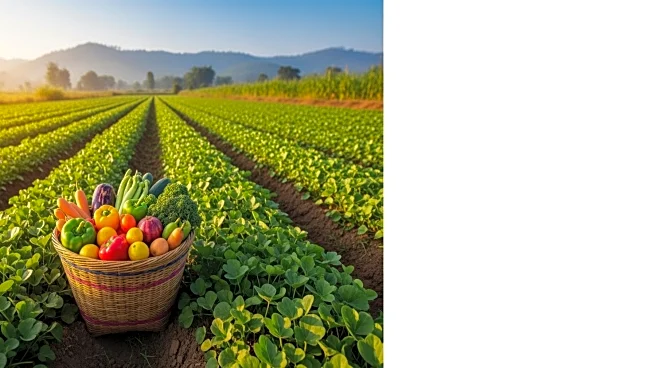What's Happening?
The Tripura Rural Economic Growth and Service Delivery Project (TRESP), supported by the World Bank and implemented by the Tribal Welfare Department of Tripura, is significantly improving agricultural
livelihoods in tribal regions. Women farmers from the Yakhili Producer Group in Mandwi R.D. Block have experienced increased productivity and confidence, thanks to technical guidance from Mr. Hiralal Debbarma, Cluster Coordinator (Agriculture), and TSA Experts. On October 25, 2025, the group successfully harvested 78 kg of Bitter Gourd, selling it at ₹70 per kg, which promises steady income throughout the season. TRESP's Agriculture Vertical, active in 23 tribal-concentrated Blocks, focuses on capacity building, scientific cultivation, improved market linkage, and income enhancement for rural households.
Why It's Important?
This initiative is crucial for fostering economic empowerment and resilience among tribal women farmers in Tripura. By providing localized technical support and community-driven agricultural planning, TRESP is helping to enhance the livelihoods of rural households. The project's focus on scientific cultivation and market linkage is expected to lead to sustainable income growth and improved living standards for tribal communities. The success of the Yakhili Producer Group serves as a model for similar initiatives, potentially influencing agricultural policies and practices in other tribal regions.
What's Next?
The continued implementation of TRESP across tribal-concentrated Blocks will likely lead to further improvements in agricultural productivity and income for rural households. As the project scales up, it may attract more support and investment, potentially expanding its reach and impact. Stakeholders, including government agencies and NGOs, may look to replicate this model in other regions, enhancing the overall economic development of tribal communities.
Beyond the Headlines
The success of TRESP highlights the importance of integrating traditional knowledge with modern agricultural practices. It underscores the potential of community-driven projects in achieving sustainable development goals. The empowerment of tribal women through agriculture not only improves economic conditions but also promotes gender equality and social inclusion.












